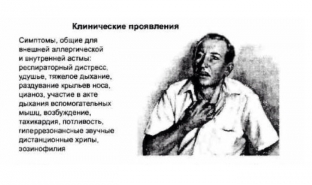Bronchial asthma is a severe pathology of the body, which is characterized by the presence of a chronic inflammatory process in the human respiratory tract. Bronchial asthma can occur at any age, in patients of different sexes. This chronic pathology accompanies a person throughout his life, and requires lifelong use of medications. Therefore, knowledge about the characteristic symptoms of bronchial asthma is necessary both for practicing doctors of various specialties and for ordinary people who theoretically can be exposed to this pathology.
Characteristic symptoms and main complications of bronchial asthma
The clinical picture of bronchial asthma is quite specific, having the necessary knowledge about this pathology, it will not be difficult for any person to recognize it. Symptoms of bronchial asthma indicate the defeat of the pathological process of the human respiratory tract, and appear accordingly. In addition, a long-term disease threatens the patient with the development of complications of bronchial asthma, which must also be remembered. Asthma attacks often occur at night, when only the patient himself or nearby relatives can give him first aid, therefore, knowledge of the symptoms of bronchial asthma is so necessary for every person.
Symptoms of bronchial asthma:
- clinical picture of pathology: symptoms of bronchial asthma;
- severity depending on the severity of asthma symptoms;
- what complications can occur with bronchial asthma.
Clinical picture of pathology: symptoms of bronchial asthma
In the clinical picture of bronchial asthma, three main symptoms come to the fore: respiratory disorders, wheezing and coughing. The attack often occurs at night: between 1 o'clock in the morning and five o'clock in the morning. The patient can take a quick and intermittent breath, after which he has difficulty exhaling. The expiratory phase is several times longer than the inspiratory phase. To facilitate breathing, patients take a characteristic posture: the body is tilted forward, hands rest on a hard surface. At the time of an asthma attack, dry whistling rales are heard in the patient's lungs, which are called remote, because they can be heard even without special equipment. An attack of bronchial asthma most often ends with a cough with the release of a thick "vitreous" sputum.

Depending on the severity of the symptoms of bronchial asthma, there is a classification of this disease according to its severity. In accordance with this classification, 4 degrees of severity of bronchial asthma are distinguished:
- intermittent bronchial asthma: pathology symptoms occur less frequently than once a week, exacerbations do not last long, night attacks occur no more than 2 times a month;
- mild persistent bronchial asthma: symptoms occur more often than once a week, but less than once a day, during exacerbations the patient's sleep may be disturbed and physical activity worsened, night attacks occur more than twice a month;
- moderate persistent asthma: symptoms of bronchial asthma occur daily, significantly affect the quality of life of the patient, nocturnal attacks occur more than once a week;
- severe persistent asthma is characterized by daily symptoms, frequent exacerbations and nocturnal attacks of the disease, as well as a significant limitation of the patient's physical activity.







Add a comment